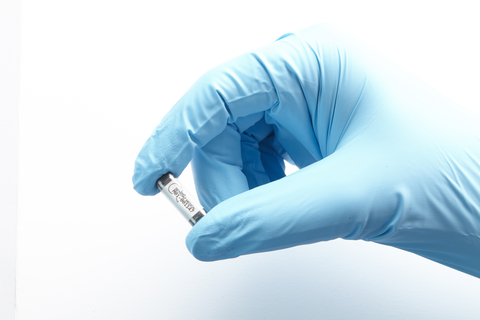SetPoint Medical Announces Late-Breaking Data from RESET-RA Study at ACR Convergence 2024
SetPoint Medical Announces Late-Breaking Data from RESET-RA Study at ACR Convergence 2024
New positive data demonstrate promising clinical benefits of Company’s neuroimmune modulation platform through 24-week follow-up
VALENCIA, Calif.--(BUSINESS WIRE)--SetPoint Medical, a clinical-stage healthcare company dedicated to people living with chronic autoimmune diseases, today announced late-breaking data from the RESET-RA study presented at the American College of Rheumatology (ACR) Convergence 2024, the largest global gathering of rheumatologists. New clinical trial results support the SetPoint System's potential as a first-of-its-kind neuroimmune modulation treatment for adults living with moderate-to-severe rheumatoid arthritis (RA) who are incomplete responders or intolerant to at least one biologic or targeted synthetic disease-modifying anti-rheumatic drugs (b/tsDMARDs).
SetPoint Medical previously announced the primary efficacy endpoint of ACR20 response was met in the RESET-RA study, which enrolled 242 participants. An ACR20 response is a composite measure of the effectiveness of RA treatments set forth by the American College of Rheumatology.
“Despite treatment advancements, several challenges and unmet medical needs remain for more than 1.5 million adults in the United States who are living with rheumatoid arthritis and its disabling impact,” said John Tesser, MD, FACP, FACR, MACR of Arizona Arthritis & Rheumatology Associates in Phoenix, AZ, and national rheumatologist principal investigator of the study. “The results from the RESET-RA study, highlighting improvements in disease severity and joint protection, underpin the continued positive clinical impact of neuroimmune modulation as a potential novel treatment for rheumatoid arthritis.”
Dr. Tesser presented the late-breaking abstract titled, “Neuroimmune Modulation in Adults with Rheumatoid Arthritis and Inadequate Response or Intolerance to Biological or Targeted Synthetic DMARDs: Results at 12 and 24 Weeks from a Randomized, Sham-Controlled, Double-Blind Pivotal Study,” featuring the following clinical results:
Demographics:
- Baseline demographics were representative of a contemporary RA patient population in the United States.
- Over 60% of the patients enrolled had difficult-to-treat RA, defined as having moderately to severely active RA despite trying 2 or more prior b/tsDMARDs.
Efficacy outcomes:
- ACR20 response at Week 12 showed a statistically significant difference favoring the treatment (SetPoint therapy) group (35.2%) compared with the sham control group (24.2%) (p-value=0.0209, 95% CI 0.6 to 23.1). After Week 12, all patients were crossed over to receive SetPoint therapy (treatment group continued; control group crossed over). At 24 weeks of follow-up, ACR20 responses in patients on SetPoint therapy, and free of added b/tsDMARD, was 51.5% in treatment group and 53.1% in crossover group.
- Prespecified subgroup analysis highlighted that ACR20 response at Week 12 in patients with 1 prior b/tsDMARD exposure, representing approximately 39% of the study population, was higher with 44.2% response in the treatment group compared to 19.0% in the control group (p-value=0.0054, 95% CI 7.1 to 43.3).
- Disease Activity Score (DAS28-CRP) improved for those patients treated with SetPoint therapy, with a statistically significantly higher proportion of patients in the treatment group achieving low disease activity or remission (DAS28-CRP<3.2) compared with the control group at 12 weeks (p-value=0.0154).
- At 12 weeks, Rheumatoid Arthritis Magnetic Resonance Imaging Scoring (RAMRIS) was utilized to calculate the proportion of bone erosion progressors (>0.5 change in erosion score) and included two subgroup analyses: In patients with 1 prior b/tsDMARD at baseline, the proportion of bone erosion progressors was 74% lower with SetPoint therapy (treatment) compared to control (p-value=0.0099). Further, in patients with a highly erosive phenotype (severe synovitis or osteitis at baseline) the proportion of bone erosion progressors in those patients receiving SetPoint therapy was 50% lower compared to control (p-value=0.016).
- Through Week 24, 81% of patients in the study were managed on SetPoint therapy, without addition of adjunctive steroids or b/tsDMARDs.
Safety outcomes:
- The related serious adverse event (SAE) rate was low (1.7%) through the first 12 weeks, with no related SAEs observed during follow-up between 12 to 24 weeks.
- The related adverse event (AE) with highest frequency was mild to moderate hoarseness (vocal cord dysfunction) associated with the implantation procedure, a known risk of surgery near the vagus nerve.
- No patient discontinued the study due to adverse events through Week 24.
- There were no deaths in the study.
“RESET-RA is the first randomized, sham-controlled trial to positively demonstrate the clinical potential of neuroimmune modulation for the treatment of RA,” said David Chernoff, M.D., Chief Medical Officer of SetPoint Medical. “I am very encouraged by the clinical outcomes and joint MRI results from this rigorously conducted trial. We look forward to continued evaluation of the long-term data for the SetPoint System that has, thus far, demonstrated its potential to treat RA without the immunosuppressive safety risks associated with the current medical therapies.”
The SetPoint System includes an implantable, rechargeable neurostimulation device that is designed to electrically stimulates the vagus nerve to activate innate anti-inflammatory pathways, providing the potential to treat autoimmune conditions like RA while preserving immune surveillance against infections. After placement during an outpatient procedure, the SetPoint System is programmed to automatically stimulate the vagus nerve daily on a preset schedule to improve adherence and persistence with therapy.
About SetPoint Medical
SetPoint Medical is a privately held clinical-stage healthcare company dedicated to treating people living with chronic autoimmune diseases. The company is developing a novel platform designed to stimulate the vagus nerve to activate neuroimmune pathways to produce a systemic anti-inflammatory and immune-restorative effect. SetPoint Medical’s platform technology is designed to offer patients and providers a treatment alternative for rheumatoid arthritis, multiple sclerosis, inflammatory bowel disease and other chronic autoimmune conditions with potentially less risk and cost than drug therapy. SetPoint Medical makes no claims that the investigational products are safe or effective. For more information, visit www.setpointmedical.com.
Contacts
Emma Yang
Health+Commerce
media@setpointmedical.com

